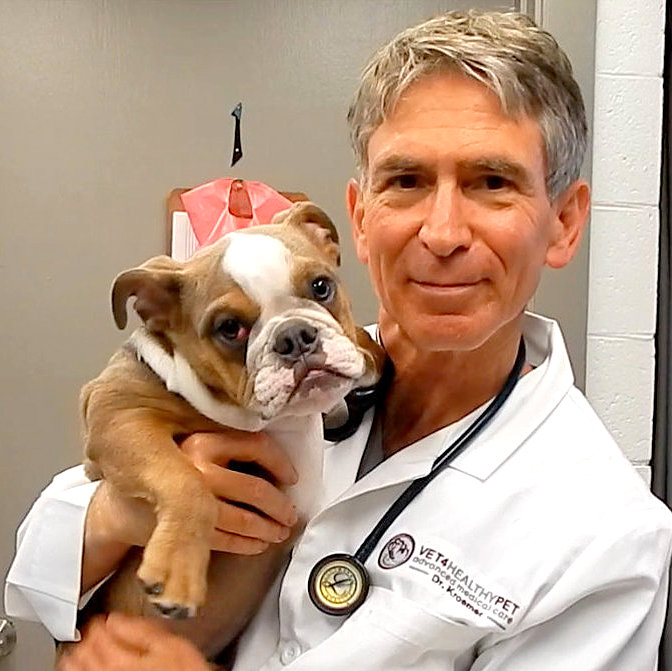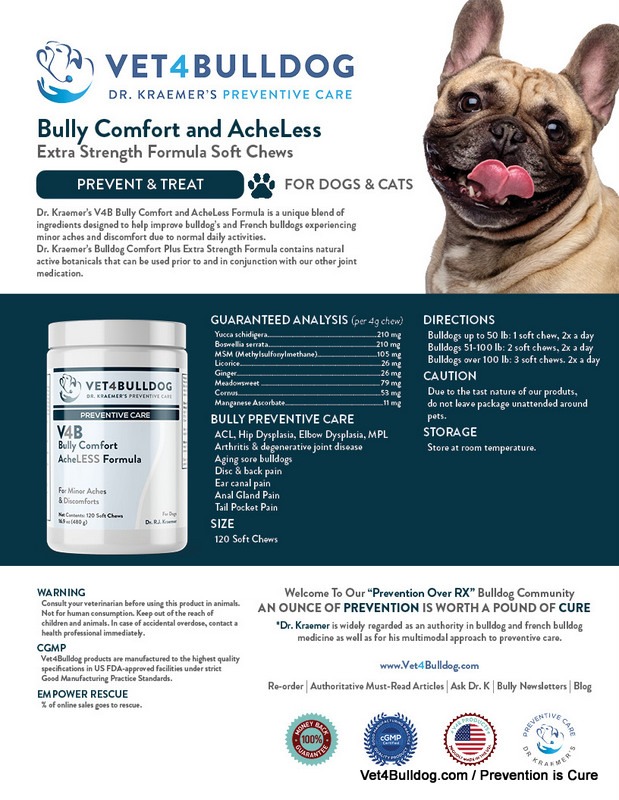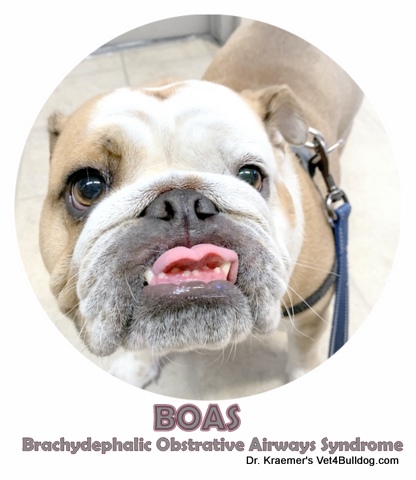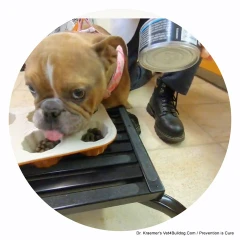Bulldogs, and French Bulldog puppies, are known for their affectionate and social nature, often forming strong bonds with their owners and families. However, this closeness can sometimes lead to anxiety issues, particularly when they are left alone or placed in unfamiliar environments such as boarding facilities.
Boarding anxiety adds another layer of stress for these dogs. When placed in a foreign location, being surrounded by unfamiliar sights, sounds, and smells, is likely to amplify their anxiety. Additionally, being separated from their owners for an extended period of time can further distress them.
Separation anxiety is a common issue, especially for those who are overly dependent on their owners or whose routines are unpredictable.

Bulldog Anxity and AGE
Anxiety in Bulldogs and French Bulldogs / TYPE and CAUSE:
Additional sources can contribute to your bulldog’s mental anxiety; below are a few common examples:
- Noise Phobias: Loud noises such as t
- thunderstorms
- fireworks
- construction sounds
- garbage truck
- home appliances
- Fear: Bulldogs can develop fears of certain objects, situations, other pets, or people. This fear can manifest as anxiety or avoidance behaviors.
- Boarding and Kenneling: As previously mentioned, boarding and kenneling can be stressful experiences for Bulldogs and French Bulldogs due to the unfamiliar environment and separation from their owners.
- Daycare: While daycare can provide socialization and stimulation for dogs, it can also be overwhelming for some bulldogs, especially if they are not used to being around other dogs for extended periods of time.
- New Pets or Residents: Introducing a new pet or family member into the household can disrupt the established dynamics and cause anxiety in bulldogs.
- Past Trauma: Bulldogs, like people, can carry emotional trauma from previous experiences such as abuse, neglect, or mistreatment.
- Family death or illness: can be very emotional to your pet and lead to a period of stress and depression
- Socialization: insufficient socialization

Anxiety in Bulldogs and French Bulldogs / SYMPTOMS:
- Vocalization: This includes barking, howling, and whining, which can be expressions of distress or a call for attention or reassurance.
- Destructive Behaviors: Bulldogs may engage in destructive behaviors such as chewing furniture, scratching doors, or digging.
- House Soiling: Accidents in the house, such as urinating or defecating indoors.
- Clinginess: Bulldogs may become excessively clingy or attached to their owners, seeking constant reassurance and attention as a coping mechanism for their anxiety.
- Depression: Some bulldogs may become withdrawn, lethargic, or exhibit signs of depression when experiencing chronic or severe anxiety.
- Loss of Appetite: Bulldogs with boarding anxiety may refuse to eat or drink while in a boarding facility, leading to weight loss and further stress.
- Hiding: Fearful bulldogs may seek hiding spots to escape from perceived threats or sources of anxiety, such as loud noises or unfamiliar environments.
- Shaking: Full-body shaking or trembling can occur in bulldogs experiencing intense fear or anxiety, especially in response to loud noises or traumatic events.
- Escape Attempts: Extreme fear or panic can drive bulldogs to attempt escape, leading to behaviors such as trying to break through windows or doors.
- Aggressive Posturing: Bulldogs may exhibit aggressive behaviors such as growling, baring teeth, or flattening their ears backward when feeling threatened or anxious.
- Panic Attacks: In cases of severe separation anxiety, bulldogs may experience panic attacks characterized by intense stress, agitation, and physical symptoms such as rapid breathing or trembling.
Ignored and left untreated will lead exasperate the problem
Separation and Anxiety in Bulldogs / PREVENTION:
Prevention and management strategies play a crucial role in minimizing anxiety in bulldogs and French bulldogs.
Here are some effective methods for preventing anxiety:
- Early Socialization: Exposing your puppy to a variety of people, animals, and environments from a young age can help them become well-adjusted and confident adults. Early socialization helps reduce fear and anxiety related to new experiences.
- Stress-Free Environment: Providing a loving, stress-free, and relaxed home environment is essential for mental well-being.
- Minimizing household chaos
- Maintaining a predictable routine
- Offering plenty of positive interactions
- Regular Exercise and Playtime: Bulldogs are active dogs despite their laid-back appearance and benefit from regular exercise and play. Physical activity helps reduce stress and promotes mental and physical well-being.
- Balanced Diet and Good Health: A nutritious and balanced diet helps ensure bulldogs remain in good health. Physical ailments and discomfort can contribute to anxiety, so maintaining overall wellness is crucial.
- Routine & Regularity: Bulldogs thrive on routine and predictability. To help create a sense of security and stability, establish consistent
- feeding times
- walking schedules
- household routines
- Dog Walker or Daycare: Hiring a dog walker or enrolling bulldogs in doggy daycare can provide additional socialization, exercise, and mental stimulation, particularly for owners with busy schedules.
- Playmates: Providing bulldogs with opportunities for social interaction with other dogs can be beneficial for their mental well-being. Playdates or trips to the dog park allow bulldogs to engage in natural social behaviors and burn off excess energy.
- Natural Calming Supplements: Some bulldogs may benefit from natural calming supplements or products designed to support relaxation and reduce anxiety.
By implementing these preventive measures, owners can help create a supportive and enriching environment that promotes the overall well-being and mental health of their Bulldogs and French Bulldogs, reducing the likelihood of anxiety-related issues.
Anxiety in Bulldogs and French Bulldog TREATMENT
Unfortunately, some owners resort to punishment and correction methods that exasperate the anxiety despite being well-intended
BULLDOG ANXIETY AND PUNISHMENT WARNING
Punishment-based methods such as yelling, spraying water, physical corrections, or using devices like bark collars, shock collars, or vibrating collars can have detrimental effects on your emotional well-being, especially when dealing with anxiety-related behaviors like destructive chewing, house soiling, or excessive barking.
It’s crucial to understand that your bully puppy does not exhibit these behaviors out of spite or malicious intent but rather as a result of anxiety, fear, or distress. Punishment in these situations can exacerbate the underlying anxiety and fear, leading to further stress and potentially causing additional behavioral issues.
Moreover, punishment-based methods can damage the bond of trust between the dog and the owner, leading to increased fear and avoidance behaviors. Dogs may become more fearful of their owners or the environment, which can worsen separation anxiety and other anxiety-related problems.
Instead of punishment, it’s important to address the root causes of the dog’s anxiety and employ positive reinforcement-based training methods to encourage desirable behaviors.

1. BULLDOG ANXIETY / SAFE ENVIRONMENT
A safe and comfortable environment for the dog, providing mental and physical enrichment, gradually desensitizing the dog to anxiety triggers, and reinforcing calm and relaxed behaviors.
2. BULLDOG ANXIETY / DOG TRAINER
Seeking guidance from a certified professional dog trainer or animal behaviorist who uses force-free and positive reinforcement-based methods can help owners effectively manage and address anxiety-related behaviors in their dogs while maintaining a positive and trusting relationship.
3. BULLDOG ANXIETY / CALM ENVIRONMENT
Creating a calm and soothing environment using methods such as essential oils, soft music, or classical music can help reduce anxiety
4. BULLDOG ANXIETY / TOYS
Providing your puppy with stimulating toys can help distract them from their anxiety and redirect their focus. Interactive toys that dispense treats or require problem-solving skills, such as puzzle toys or snuffle mats, can be particularly effective in keeping bulldogs mentally engaged and reducing stress. Puzzle toys, such as Kongs or West Paw puzzle toys, can provide mental stimulation and enrichment.

5. BULLDOG ANXIETY / EXERCISE
Regular exercise is essential for bulldogs to maintain physical and mental health. Daily walks and play sessions help burn off excess energy, reduce stress hormones, and promote relaxation.
6. BULLDOG ANXIETY / DAILY SCHEDULE
Establishing a consistent daily schedule for feeding, exercise, and rest can provide bulldogs with a sense of security and predictability, which can help alleviate anxiety.
7. BULLDOG ANXIETY / DOG SITTER
Minimizing the time bulldogs spend alone can help prevent or reduce separation anxiety. Taking your dog to work, hiring a dog sitter, or arranging for your dog to stay with friends or family members can provide companionship and reduce feelings of loneliness and anxiety.
By implementing these strategies consistently, owners can help create a supportive and enriching environment for Bulldogs, promoting their overall well-being and reducing anxiety levels. However, it’s essential to remember that severe anxiety may require professional intervention from a veterinarian or certified animal behaviorist for effective management and treatment
8. BULLDOG ANXIETY AND SEPARATION PRESCRIPTION DRUGS
Medication can play a crucial role in reducing the immediate symptoms of anxiety, allowing for more effective behavior modification training. Here’s an overview of the strategy:
- Reconcile (fluoxetine) and Clomicalm (clomipramine) are both approved for the treatment of separation anxiety in dogs in the United States. These medications act on the brain’s neurotransmitters to help reduce anxiety and facilitate easier learning during behavior modification training.
It’s important to note the onset of their full effect can take 4–8 weeks.
- Shorter-acting medications like trazodone, gabapentin, clonidine, or alprazolam are used in conjunction with long-term anxiety medications to provide more immediate relief from acute anxiety symptoms. These can be especially helpful in the initial stages of treatment or in situations known to induce anxiety, such as when the owner leaves the house.
Medications are most effective when used in conjunction with behavior modification techniques. This dual approach addresses both the physiological and psychological aspects of separation anxiety.
Separation and Anxiety in Bulldogs and French Bulldog TIPS &WARNINGS
BULLDOG ANXIETY FEEDING TIP:
Anxiety and stress can indeed lead to overeating in some dogs, which, in turn, can lead to obesity and related health issues. Utilizing a food dispensing machine that schedules feeding times and controls the amount of food dispensed can help manage this issue by providing a consistent and measured feeding routine.
STRESS & ANXIETY IMMUNE COMPROMISED WARNING
Long-term anxiety and stress can indeed weaken the immune system, making dogs more susceptible to diseases and illnesses. The physiological stress response can lead to an imbalance in immune function, highlighting the need for early intervention and management of anxiety to support overall health.
PREVNTION IS CURE
BULLDOG ANXIETY AND MENTAL PAIN WARNING
Mental anguish, such as that caused by anxiety and stress, can be as debilitating as physical pain. Behavioral signs of distress should be taken seriously, as they indicate the dog’s suffering.
Delaying treatment can lead to a worsening of symptoms and the development of more severe behavioral issues.
ANXIETY AND PUNISHMENT FOR UNWANTED BEHAVIOR WARNING
Punishing anxiety-related behaviors can exacerbate anxiety and fear rather than alleviate them. Dogs do not understand punishment as related to their anxiety behaviors; instead, they may develop other undesirable behaviors as coping mechanisms or exhibit submissive postures in an attempt to appease their owners. These responses are often misunderstood as guilt, further complicating the issue.
BULLDOG ANXIETY PROFESSIONAL CONSULTATION TIP
At the first signs of anxiety or stress-related behavior, consulting with a veterinarian or a certified animal behaviorist is crucial. They can provide a comprehensive approach that includes medical evaluation, behavior modification strategies, and, if necessary, medication.
- Positive Reinforcement: Focusing on positive reinforcement techniques to encourage desired behaviors helps build confidence and reduce anxiety.
- Environmental Enrichment: Providing a safe and enriching environment with plenty of physical and mental stimulation can help reduce stress and anxiety.
- Emotional Support: Offering consistent emotional support and building a strong, trusting relationship
Recommended by Owners Approved by Bulldogs




















